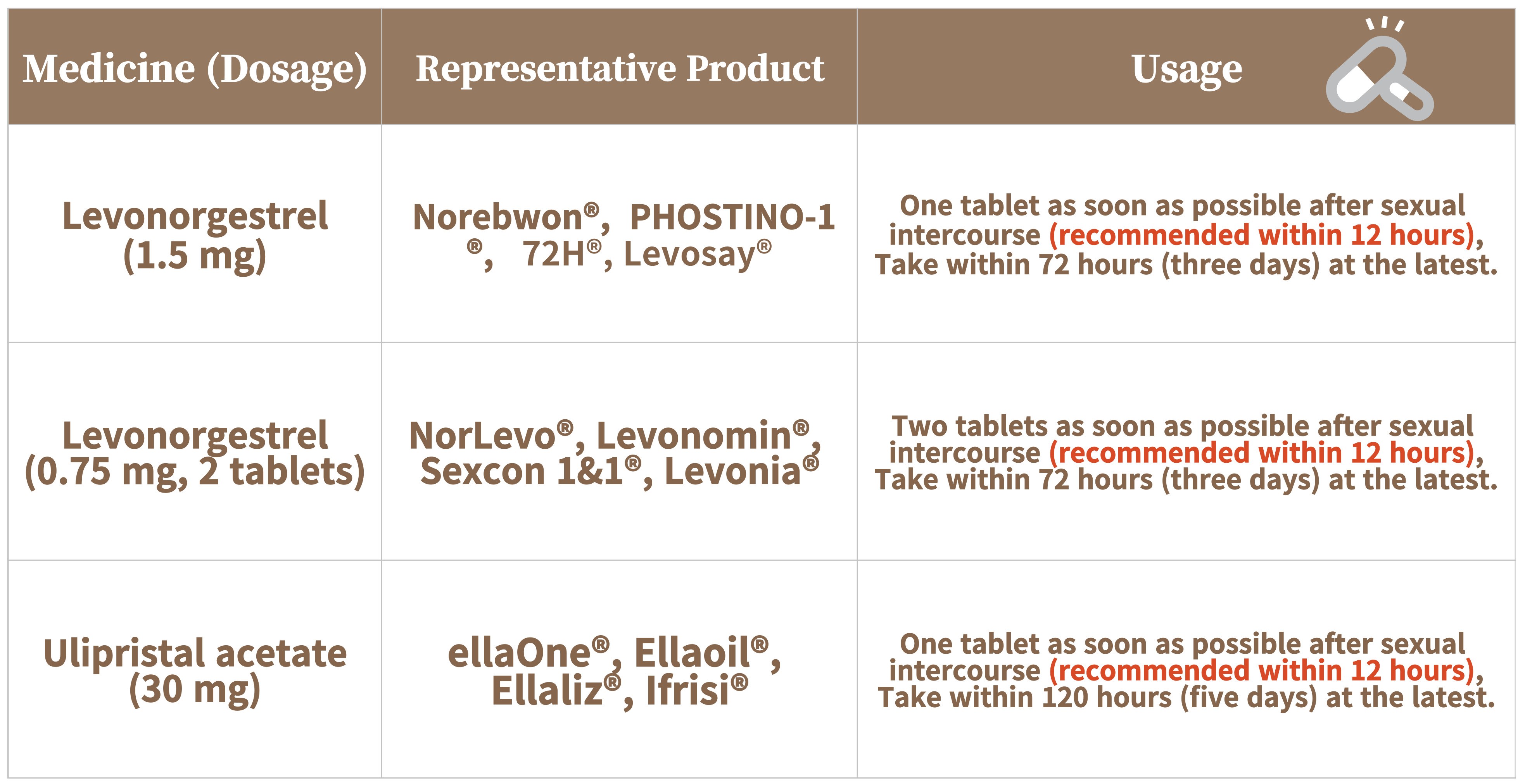 |
| ▲ Types of ECPs according to ingredients and how to take them |
Emergency contraception pills (ECPs), also called morning- after pills, is a drug that is taken as an emergency after sexual intercourse to artificially lower the possibility of pregnancy. In Korea, emergency contraceptives are classified as ethical drugs. Ethical drugs are drugs that must be used under the professional diagnosis and supervision of a doctor, and are difficult to access unlike over the counter drugs that pharmacists or consumers can choose because their safety and effectiveness are recognized.
According to the Ethics Charter of the Catholic Medical Center it clearly states the content, 'In accordance with the Church's teaching on birth control, we do not provide or recommend any method of contraception other than natural birth control. Neither artificial contraception nor ECPs are supported.' Accordingly, hospitals affiliated with the Catholic Medical Center do not actually prescribe ECPs. In the meantime, there have been several debates about whether ECPs should be classified as ethical or over the counter drugs. Since ECPs use high concentrations of progesterone or progesterone receptor modulators to interfere with ovulation and implantation of fertilized eggs, it is highly likely to cause side effects by causing rapid changes in a woman's body. Typical side effects include nausea, diarrhea, vomiting, headache, and menstrual delay. Accordingly, in Korea, emergency contraceptives were classified as ethical drugs in consideration of the need to prevent indiscriminate misuse, abuse, and to deal with side effects appropriately. From 2012 to 2016, the Ministry of Food and Drug Safety attempted to switch to over the counter drugs with the assertion that, ‘there is no particular issue in the appearance of side effects, and it has been used for a long time at home and abroad.’ However, it failed due to objections from the religious world and the medical association, including the Korean Christian Bioethics Association. The Korean Association of Obstetricians & Gynecologists, one of the medical associations, issued a statement stating, ‘The increased use of ECPs can lead to negligence in taking the oral contraceptive pills, leading to the spread of an irresponsible sex culture.’
On the other hand, the World Health Organization recommends that emergency contraceptives be provided proactively and in advance to all women who need them. According to the WHO’s, ‘Family Planning: Global Handbook for Providers, 2018,’ it says, ‘ECPs interrupt or delay the ovulation process in which eggs are released from the ovaries. Therefore, it is different from an abortion pill because the drug does not take effect after the fertilized egg is implanted.’ In addition, it is stated that, ‘emergency contraceptive pills are safe and suitable for all women, and they can be purchased as over the counter drugs in many countries, including Canada, China, India, and the United States.’
There are two types of ECPs, levonorgestrel and ulipristal, which should be taken as soon as possible after sexual intercourse. Levonorgestrel reduces the success rate of contraception to 95% within 24 hours, 85% within 48 hours, and 58% within 72 hours after sexual intercourse. Ulipristal has the advantage of being 90- 95% effective in contraception up to five days after sexual intercourse, but it is retailed at a high price. Since most emergency contraceptive pills use levonorgestrel, emergency contraceptive pills should be taken as soon as possible after sexual intercourse to see the effect of contraception.
Contraception is important for both men and women to prevent unwanted pregnancies. If contraception has failed due to an incorrect birth control method or unforeseen circumstances, emergency contraception can be taken. However, emergency contraception can cause side effects in a woman's body. Additionally, it is much more expensive than the contraceptive pill because you have to pay for medical expenses, prescriptions, and medicines at the same time. If ECPs are to be maintained as ethical drugs, institutional measures should be prepared to reduce the burden on consumers in terms of cost, such as setting them at a lower price than they are now or providing extensive insurance coverage to reduce the burden on consumers. Since prior contraception is less burdensome on women's bodies in terms of safety and cost than post contraception, it is hoped all CWNU students pay attention to prior contraception.
By Kim Na-young, cub-reporter skdud2986@naver.com
<저작권자 © The Campus Journal, 무단 전재 및 재배포 금지>

 Shrinkflation, Consumer Deception
Shrinkflation, Consumer Deception




